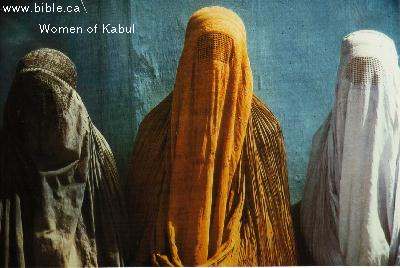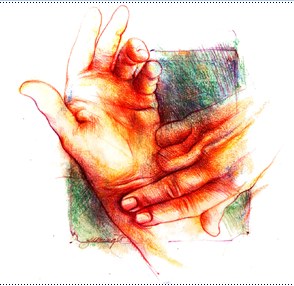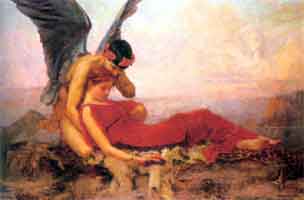Crotchless Panties, Edible Undies, or Leather Thong:
What Would Jesus Wear?

Bishop Backs Panty Parties To Spread Church Message
from Telegraph
Evangelism and erotic underwear are rarely linked outside the tabloid newspapers. But a new book backed by a Church of England bishop urges Christians to spread the message to their friends and neighbours by hosting lingerie parties.
 The book, Open the Door, argues that in an age when more people know their zodiac signs than the Ten Commandments, Christians have to use unconventional methods to reverse the decline in churchgoing.
The book, Open the Door, argues that in an age when more people know their zodiac signs than the Ten Commandments, Christians have to use unconventional methods to reverse the decline in churchgoing.It says: "What a tragedy that we are surrounded daily with television programmes, art, film and even real-life stories sold to magazines and newspapers that champion casual sex and pornography, yet as Christians we often have so little to say about it."
The book, produced by the charity Activate, which is primarily aimed at women, also recommends murder mystery evenings and "pamper" parties as ways to break the ice with non-churchgoers. Other opportunities to spread the faith include knitting groups and book clubs.
 The Rev. Jan Harney, a Church of England cleric in Manchester who also works for Activate, said that she wanted Christians to relax, have fun and to get to know people before trying to convert them.
The Rev. Jan Harney, a Church of England cleric in Manchester who also works for Activate, said that she wanted Christians to relax, have fun and to get to know people before trying to convert them."I have not conducted a lingerie party myself, but when Bridget Jones was all the rage I know that some Christian groups were holding knickers parties," she said. "To be honest, I am not sure what happened at those. Nobody has told me.
"But I have held chocolate parties...I also like pamper parties, when we can enjoy a massage or a manicure or try beauty products. It is a way to get to know people who will never normally go near a church."
The bishop said that he was a devotee of the Big Brother television show because the issues that surfaced during the programme were often more real to ordinary people than those raised in church.




 In the Bible, Jesus was forced to wear a crown of thorns by mocking Roman guards before he was crucified. In the advert, a young man smiles cheekily, wearing a crown whose thorns are twisted into the geometric shapes that are PlayStation's logo.
In the Bible, Jesus was forced to wear a crown of thorns by mocking Roman guards before he was crucified. In the advert, a young man smiles cheekily, wearing a crown whose thorns are twisted into the geometric shapes that are PlayStation's logo.
 The corpses were wrapped in plastic and concealed inside statues of Christian icons, which were smashed open.
The corpses were wrapped in plastic and concealed inside statues of Christian icons, which were smashed open. 

 The judge told Mohamed Kamal Mustafa, imam of a mosque in the southern resort of Fuengirola, to spend six months studying three articles of the constitution and the universal declaration of human rights.
The judge told Mohamed Kamal Mustafa, imam of a mosque in the southern resort of Fuengirola, to spend six months studying three articles of the constitution and the universal declaration of human rights.



 The seminary is the first in the country to face the scrutiny of inquisitors in their investigation of gays in American seminaries. The Vatican ordered the investigation of America's 229 seminaries to identify gays gets in the aftermath of the child sex abuse scandal that has gripped the Church in the US.
The seminary is the first in the country to face the scrutiny of inquisitors in their investigation of gays in American seminaries. The Vatican ordered the investigation of America's 229 seminaries to identify gays gets in the aftermath of the child sex abuse scandal that has gripped the Church in the US.
 "It's the first movement to try to drive a wedge between students and the scientific process," said Brown University's Kenneth Miller (left), the first witness called by lawyers for eight families suing the Dover Area School District. Dover is believed to be the nation's first school system to require that students be exposed to the intelligent design concept.
"It's the first movement to try to drive a wedge between students and the scientific process," said Brown University's Kenneth Miller (left), the first witness called by lawyers for eight families suing the Dover Area School District. Dover is believed to be the nation's first school system to require that students be exposed to the intelligent design concept. He testified that "intelligent design is not science" and aimed to refute several core claims made in Of Pandas and People, which is the beginner's manual to intelligent design, and is mentioned in the four-paragraph statement read to students. Miller said the book omits discussion of what causes extinction. Since nearly all original species are extinct, he said, any intelligent design creator would not have been very intelligent.
He testified that "intelligent design is not science" and aimed to refute several core claims made in Of Pandas and People, which is the beginner's manual to intelligent design, and is mentioned in the four-paragraph statement read to students. Miller said the book omits discussion of what causes extinction. Since nearly all original species are extinct, he said, any intelligent design creator would not have been very intelligent. Crick, the Nobel Prize-winning DNA researcher, suggested in a book that life could have been put on Earth by space aliens. That fits neatly into the intelligent design concept, whose supporters try not to identify the designer whom they believe is behind nature's complex machinery.
Crick, the Nobel Prize-winning DNA researcher, suggested in a book that life could have been put on Earth by space aliens. That fits neatly into the intelligent design concept, whose supporters try not to identify the designer whom they believe is behind nature's complex machinery. Bryan Rehm (right), a Dover physics teacher until June 2004, recalled Buckingham making a reference to Jesus' crucifixion: "Two thousand years ago, somebody died on a cross. Can't somebody stand up and do something for him?"
Bryan Rehm (right), a Dover physics teacher until June 2004, recalled Buckingham making a reference to Jesus' crucifixion: "Two thousand years ago, somebody died on a cross. Can't somebody stand up and do something for him?" In other testimony Tuesday, plaintiff Tammy Kitzmiller (left) said that in January, her younger daughter chose not to hear the intelligent-design statement — an option given all students — putting her in an awkward position.
In other testimony Tuesday, plaintiff Tammy Kitzmiller (left) said that in January, her younger daughter chose not to hear the intelligent-design statement — an option given all students — putting her in an awkward position.

 The research compares the social performance of relatively secular countries, such as Britain, with the US, where the majority believes in a creator rather than the theory of evolution.
The research compares the social performance of relatively secular countries, such as Britain, with the US, where the majority believes in a creator rather than the theory of evolution.  and abortion in the prosperous democracies. The United States is almost always the most dysfunctional of the developing democracies, sometimes spectacularly so."
and abortion in the prosperous democracies. The United States is almost always the most dysfunctional of the developing democracies, sometimes spectacularly so."  Paul says the evidence accumulated by several different studies suggests religion may contribute to social ills.
Paul says the evidence accumulated by several different studies suggests religion may contribute to social ills. 
 Russian Patriarch Alexei II, head of the Russian Orthodox Church, carried a reliquary and an icon of the admiral, who was canonised in 2004, into the Moscow chapel of the Russian Air Force's 37th Air Army in Moscow, Russia's RIA Novosti news agency said Monday.
Russian Patriarch Alexei II, head of the Russian Orthodox Church, carried a reliquary and an icon of the admiral, who was canonised in 2004, into the Moscow chapel of the Russian Air Force's 37th Air Army in Moscow, Russia's RIA Novosti news agency said Monday. The Republican-led House approved a bill to renew the Head Start program through 2011. The bill includes a provision that would let churches and other faith-based preschool centers hire only people who share their religion yet still receive federal tax dollars.
The Republican-led House approved a bill to renew the Head Start program through 2011. The bill includes a provision that would let churches and other faith-based preschool centers hire only people who share their religion yet still receive federal tax dollars.

 But therein lies the rub: Which god? When the founding fathers established the Constitution of the United States, they chose to include the separation of church and state. This was to ensure that the state-sanctioned religious persecutions that plagued much of Europe during the 16th century would not despoil the young, yet grand experiment in democracy that was to become this Republic.
But therein lies the rub: Which god? When the founding fathers established the Constitution of the United States, they chose to include the separation of church and state. This was to ensure that the state-sanctioned religious persecutions that plagued much of Europe during the 16th century would not despoil the young, yet grand experiment in democracy that was to become this Republic. Scientists now believe that there is an intrinsic logic to our reality, that there are absolutes, laws of nature. Much remains a mystery, and as one question is answered, many others arise. The question now facing Pennsylvania's Dover School District is whether or not the imposition of one creation belief on a multi-ethnic, secular student body is in keeping with the law that prohibits the creation of a state religion. If they allow one belief system to be taught, surely they must also teach others?
Scientists now believe that there is an intrinsic logic to our reality, that there are absolutes, laws of nature. Much remains a mystery, and as one question is answered, many others arise. The question now facing Pennsylvania's Dover School District is whether or not the imposition of one creation belief on a multi-ethnic, secular student body is in keeping with the law that prohibits the creation of a state religion. If they allow one belief system to be taught, surely they must also teach others?


 science and themselves as revolutionaries. They envision toppling Darwinian evolution – once a revolutionary idea itself – and erecting in its place a theory about life that allows for supernatural explanations, a theory that makes God, or some entity very much like him, not just possible but necessary.
science and themselves as revolutionaries. They envision toppling Darwinian evolution – once a revolutionary idea itself – and erecting in its place a theory about life that allows for supernatural explanations, a theory that makes God, or some entity very much like him, not just possible but necessary. contain parts that are too well matched to be products of evolution.
contain parts that are too well matched to be products of evolution. To understand why, it is important to remember that Behe's main argument is that in an irreducibly complex system, every part is vital to the system's overall operation.
To understand why, it is important to remember that Behe's main argument is that in an irreducibly complex system, every part is vital to the system's overall operation. that the parts within them are useless on their own," said Kenneth Miller, a biologist at Brown University in Rhode Island. "The instant that I or anybody else finds a subset of parts that has a function, that argument is destroyed."
that the parts within them are useless on their own," said Kenneth Miller, a biologist at Brown University in Rhode Island. "The instant that I or anybody else finds a subset of parts that has a function, that argument is destroyed." Dembski, a mathematician and philosopher affiliated with the Discovery Institute, a Seattle-based Christian think tank that serves as the nerve center for the ID movement.
Dembski, a mathematician and philosopher affiliated with the Discovery Institute, a Seattle-based Christian think tank that serves as the nerve center for the ID movement. There is a way to settle this, however, because like Behe's irreducible complexity, the concept of specified complexity can also be tested.
There is a way to settle this, however, because like Behe's irreducible complexity, the concept of specified complexity can also be tested.
 questions — what does ID offer? And what can ID explain that evolution can't? — is not much and nothing, leading scientists say.
questions — what does ID offer? And what can ID explain that evolution can't? — is not much and nothing, leading scientists say. Being — and also ends there. The explanations offered by ID are not really explanations at all, scientists say. They're more like last resorts. And, scientists argue, there is a danger in pretending that ID belongs next to evolution in textbooks.
Being — and also ends there. The explanations offered by ID are not really explanations at all, scientists say. They're more like last resorts. And, scientists argue, there is a danger in pretending that ID belongs next to evolution in textbooks.


 The Pope made that comment this morning when receiving the new Mexican ambassador to the Holy See at the papal summer residence of Castel Gandolfo.
The Pope made that comment this morning when receiving the new Mexican ambassador to the Holy See at the papal summer residence of Castel Gandolfo.  'I don't know that atheists should be considered citizens, nor should they be considered patriots.
'I don't know that atheists should be considered citizens, nor should they be considered patriots. 








 you are too bitter & angry. Mellow out.
you are too bitter & angry. Mellow out. man, classic. Keep it up.
man, classic. Keep it up. read your blogs (all three) and enjoy them tremendously - but especially GW. Talk about a breath (or more like a tornado) of fresh air! Any time I need a break from the Pennsylvania Dutchies who surround me, I head over to your blog. Thanks for all that. Sorry you have to put up with all the shit you get for it. I know it's cliche, but people fear whatever they don't understand. And there are frighteningly many ignorami out there. Please keep blogging. And I say this for purely selfish reasons - I need you! ;-)
read your blogs (all three) and enjoy them tremendously - but especially GW. Talk about a breath (or more like a tornado) of fresh air! Any time I need a break from the Pennsylvania Dutchies who surround me, I head over to your blog. Thanks for all that. Sorry you have to put up with all the shit you get for it. I know it's cliche, but people fear whatever they don't understand. And there are frighteningly many ignorami out there. Please keep blogging. And I say this for purely selfish reasons - I need you! ;-) site is GREAT. I am sharing it with many of my so called "friends" I knew during my seven years at Seminary. Seminary can teach a person to hate religion like nothing else.
site is GREAT. I am sharing it with many of my so called "friends" I knew during my seven years at Seminary. Seminary can teach a person to hate religion like nothing else. fuck yourself, Lucy!
fuck yourself, Lucy! for your blog. I have been searching for a good blog to bookmark! Keep up the good work.
for your blog. I have been searching for a good blog to bookmark! Keep up the good work. just wanted to let you know, I normally don't read Blogs but yours is by far among the coolest... You're a great writer keep it up!
just wanted to let you know, I normally don't read Blogs but yours is by far among the coolest... You're a great writer keep it up! you're an atheist, do you feel things, y'know, deeply? Like love? And pain?
you're an atheist, do you feel things, y'know, deeply? Like love? And pain? feel love?! Are you fucking kidding me?!'); a week later, he abruptly ended the friendship. By email. Merry Christmas.]
feel love?! Are you fucking kidding me?!'); a week later, he abruptly ended the friendship. By email. Merry Christmas.] from Mexico. I really like your blogs, I have read them and they're so cool. Atheism rulez!
from Mexico. I really like your blogs, I have read them and they're so cool. Atheism rulez! u fukin trippin there is a god u fuken stupid ass and that picture is hella fuked u fuken uggly stupid ass ho.
u fukin trippin there is a god u fuken stupid ass and that picture is hella fuked u fuken uggly stupid ass ho. with Bible pages: the covers of the book Children's Bible Stories and the Pat Benatar single "Love Is a Battlefield / Hell Is for Children."]
with Bible pages: the covers of the book Children's Bible Stories and the Pat Benatar single "Love Is a Battlefield / Hell Is for Children."] my absolute most favorite site ever to read daily...It's hilarious, smart, and atheist. It's like my dream boy.
my absolute most favorite site ever to read daily...It's hilarious, smart, and atheist. It's like my dream boy. headline! I admit...it was funny, but not substantiated, therefore should not be used!
headline! I admit...it was funny, but not substantiated, therefore should not be used! read: Chicken Shit Wonder, I Have No Balls! Isn't it covenient to point here & point there. As a Christian I'm telling you that we don't need cowards like you anyways. Go watch Martha with your other girly boys & maybe the gay
read: Chicken Shit Wonder, I Have No Balls! Isn't it covenient to point here & point there. As a Christian I'm telling you that we don't need cowards like you anyways. Go watch Martha with your other girly boys & maybe the gay  news will tell you of a new big bang here comes the monkey man.
news will tell you of a new big bang here comes the monkey man. a frightened little boy you are. May I suggest a lobotomy? It obviously can do little harm & it might prevent more or your diseased gibberish from poisoning other unsuspecting readers - put then
a frightened little boy you are. May I suggest a lobotomy? It obviously can do little harm & it might prevent more or your diseased gibberish from poisoning other unsuspecting readers - put then - that is what little cowards like you enjoy, isn't it? Must suck to born dead.
- that is what little cowards like you enjoy, isn't it? Must suck to born dead.  Cause Toothlessness & Impotency warnings on Home Lobotomy kits?" That is correct for $600! You have control of the board - pick a category. Alex, let's continue with Ironic Self-Defeat for $800! And the answer is...DINGDINGDING! A Daily Double!]
Cause Toothlessness & Impotency warnings on Home Lobotomy kits?" That is correct for $600! You have control of the board - pick a category. Alex, let's continue with Ironic Self-Defeat for $800! And the answer is...DINGDINGDING! A Daily Double!] of the best-kept secrets in the atheist blogosphere.
of the best-kept secrets in the atheist blogosphere.
![Popes Crack! Me! Up! [Dozens & Dozens of Pope Captions]](http://www.iflipflop.com/pope_rap.jpg)

![And Just When I'd Lost All Hope, Bam!, Politics Is Interesting Again [Pro-Torture Satanic Witch-Priest Announces 2008 Presidential Run]](http://www.democraticunderground.com/articles/02/06/22_cheney.jpg)

![Popes Crack! Me! Up! [Dozens & Dozens of Pope Captions]](http://www.tribuneindia.com/2005/20050403/pope/images/p20.jpg)






![Popes Crack! Me! Up! [Dozens & Dozens of Pope Captions]](http://www.vatican.va/news_services/or/photo/21_12_2005/images/prevs/prev39.jpg)

![Popes Crack! Me! Up! [Dozens & Dozens of Pope Captions]](http://www.otoons.com/politics/images/mother_teresa_pope.jpg)

!['Your Lab Results Are In - You Might Want To Sit Down...I Wish I Had Better News: Your Mormonism Tested Positive for Bullshit. I'm Very Sorry...' [DNA Tests Disprove Core Mormonism Tenant About Native Americans]](http://www.moreenergy.net/dr_desk.jpg)













![I Knew It! 'Evangelical Christian' My Ass! [Pat Robertson Makes Satanic Hand Gesture]](http://www.jesus-is-savior.com/False%20Religions/Wicca%20&%20Witchcraft/bush_satan_hand.jpg)

![Popes Crack! Me! Up! [Dozens & Dozens of Pope Captions]](http://photos1.blogger.com/hello/185/1066/400/b16%20grab%20baby.jpg)


![Tammy Faye Theater Presents: 'Highway to Hell: The Mary Winkler Mystery' [Pastor Killed by Wife]](http://www.7th-day-arm.org/images/tammy_f_bakker.jpg)
![The Flinstone Effect [Primitive Quadroped Siblings Are Possible Evolutionary Throwback]](http://images.thetimes.co.uk/TGD/picture/0,,275596,00.jpg)

!['Your Lab Results Are In - You Might Want To Sit Down...I Wish I Had Better News: Your Mormonism Tested Positive for Bullshit. I'm Very Sorry...' [DNA Tests Disprove Core Mormonism Tenant About Native Americans]](http://www.azcentral.com/ent/gifs3/1024mormon.jpg)






















!['Tammy Faye Theater' Dinner & Movie: God Is My Co-Pilot So I Don't Need Your Tacky Damn Plane!: The Vicki O Story [Preacher's Wife Is Kicked Off Plane]](http://www.reel.com/Content/Reelimages/features2000/fea_bigtammy2.jpg)



![Popes Crack! Me! Up! [Dozens & Dozens of Pope Captions]](http://gum.kookmin.ac.kr/cwb-data/data/gum03/Pope_Benedict_XVI_foto_re_jerry_lampen.jpg)


![Why Do Objects Fall? God, That's Why [Spoof Onion Story About Evangelicals Attacking Theory of Gravity in Kansas Schools]](http://www.fictionwise.com/knight/rubens.eve.crop22.jpg)
 I'm an atheist, and that's it. I believe there's nothing we can know except that we should be kind to each other and do what we can for other people.
I'm an atheist, and that's it. I believe there's nothing we can know except that we should be kind to each other and do what we can for other people.  I do not believe in religion, but if I had to choose one, it would be Buddhism... But Buddhists say we come back as animals, and they refer to them as lesser beings. Well, animals aren't lesser beings; they're just like us. So I say fuck the Buddhists... I've got my own religion... If I get into trouble, there is no God or Allah to sort me out. I have to do it myself.
I do not believe in religion, but if I had to choose one, it would be Buddhism... But Buddhists say we come back as animals, and they refer to them as lesser beings. Well, animals aren't lesser beings; they're just like us. So I say fuck the Buddhists... I've got my own religion... If I get into trouble, there is no God or Allah to sort me out. I have to do it myself. 

 At present there is not a single credible established religion in the world... The fact that a believer is happier than a skeptic is no more to the point than the fact that a drunken man is happier than a sober one. The happiness of credulity is a cheap and dangerous quality.
At present there is not a single credible established religion in the world... The fact that a believer is happier than a skeptic is no more to the point than the fact that a drunken man is happier than a sober one. The happiness of credulity is a cheap and dangerous quality. 

 [Pointing at priest with his hand on a boy's shoulder.] That is the most frightening sight I have ever seen. Run, little boy! Run for your life!
[Pointing at priest with his hand on a boy's shoulder.] That is the most frightening sight I have ever seen. Run, little boy! Run for your life! 

 What I believe most religious tenets to be are man-made after the fact. The Bible, I've said it before, is a beautifully written work of fiction.
What I believe most religious tenets to be are man-made after the fact. The Bible, I've said it before, is a beautifully written work of fiction.  Maybe I would believe in God if he believed in me.
Maybe I would believe in God if he believed in me.  I don't believe in Heaven and Hell. I don't know if I believe in God. All I know is that as an individual, I won't allow this life - the only thing I know to exist - to be wasted.
I don't believe in Heaven and Hell. I don't know if I believe in God. All I know is that as an individual, I won't allow this life - the only thing I know to exist - to be wasted.  No man who ever lived knows any more about the hereafter... than you and I; and all religion... is simply evolved out of chicanery, fear, greed, imagination, and poetry.
No man who ever lived knows any more about the hereafter... than you and I; and all religion... is simply evolved out of chicanery, fear, greed, imagination, and poetry. 
 Climbed over mountains, traveled the sea, cast out all Heaven, cast down on my knees; I've lain with the Devil, cursed God above, forsaken Heaven, to bring you my love.
Climbed over mountains, traveled the sea, cast out all Heaven, cast down on my knees; I've lain with the Devil, cursed God above, forsaken Heaven, to bring you my love.  To you, I'm an atheist. To God, I'm the loyal opposition.
To you, I'm an atheist. To God, I'm the loyal opposition.  I'm completely atheist... I do like [going to church] but I have the sort of conscience that says if you go you are supporting the myth. And it makes me angry.
I'm completely atheist... I do like [going to church] but I have the sort of conscience that says if you go you are supporting the myth. And it makes me angry.  Religion is the idol of the mob: It adores everything it does not understand.
Religion is the idol of the mob: It adores everything it does not understand. 
 I live for now, not for what happens after I die. If I die and there's something afterwards, I'm going to Hell, not Heaven. I mean, the Devil's got all the good gear. What's God got? The Inspiral Carpets and nuns. Fuck that.
I live for now, not for what happens after I die. If I die and there's something afterwards, I'm going to Hell, not Heaven. I mean, the Devil's got all the good gear. What's God got? The Inspiral Carpets and nuns. Fuck that.  Theology is never any help. It is searching in a dark cellar at midnight for a black cat that isn't there. Theologians can persuade themselves of anything.
Theology is never any help. It is searching in a dark cellar at midnight for a black cat that isn't there. Theologians can persuade themselves of anything.  I will not swear on God. I will not swear on God because I don't believe in the conventional God, but will swear on my children and my grandchildren.
I will not swear on God. I will not swear on God because I don't believe in the conventional God, but will swear on my children and my grandchildren.  I go on record by stating that I do not believe in God.
I go on record by stating that I do not believe in God. 
 By maintaining the separation of church and state, the United States has avoided the intolerance which has so divided the rest of the world with religious wars... To retreat from that separation would violate the principles of conservatism and the values upon which the framers built this democratic republic.
By maintaining the separation of church and state, the United States has avoided the intolerance which has so divided the rest of the world with religious wars... To retreat from that separation would violate the principles of conservatism and the values upon which the framers built this democratic republic.  [Do you have religious beliefs?] None whatsoever. To be perfectly frank, I really do not…I believe in sleeping.
[Do you have religious beliefs?] None whatsoever. To be perfectly frank, I really do not…I believe in sleeping.  The secret to getting donations is to depict everyone who disagrees with you as the enemy. Then you explain how they’re systematically working to destroy everything you hold dear. It’s a war of values! Rational discussion is hopeless! Compromise is unthinkable! Our only hope is well-funded antagonism, so we need your money to keep up the fight!
The secret to getting donations is to depict everyone who disagrees with you as the enemy. Then you explain how they’re systematically working to destroy everything you hold dear. It’s a war of values! Rational discussion is hopeless! Compromise is unthinkable! Our only hope is well-funded antagonism, so we need your money to keep up the fight! 
 The way to see by faith is to shut the eye of reason: The morning daylight appears plainer when you put out your candle... I have found Christian dogma unintelligible. Early in life, I absenteed myself from Christian assemblies... Lighthouses are more helpful than churches.
The way to see by faith is to shut the eye of reason: The morning daylight appears plainer when you put out your candle... I have found Christian dogma unintelligible. Early in life, I absenteed myself from Christian assemblies... Lighthouses are more helpful than churches.  Hate to break it to you, but there is no God... I'm sickened by all religions. Religion has divided people. I don't think there's any difference between the pope wearing a large hat and parading around with a smoking purse and an African painting his face white and praying to a rock... Here's what happens when you die - you sit in a box and get eaten by worms. I promise you that when you die, nothing cool happens.
Hate to break it to you, but there is no God... I'm sickened by all religions. Religion has divided people. I don't think there's any difference between the pope wearing a large hat and parading around with a smoking purse and an African painting his face white and praying to a rock... Here's what happens when you die - you sit in a box and get eaten by worms. I promise you that when you die, nothing cool happens.  I turned to speak to God, About the world's despair; But to make bad matters worse, I found God wasn't there.
I turned to speak to God, About the world's despair; But to make bad matters worse, I found God wasn't there.  The most heinous and the most cruel crimes of which history has record have been committed under the cover of religion or equally noble motives.
The most heinous and the most cruel crimes of which history has record have been committed under the cover of religion or equally noble motives.  I don't believe in the afterlife. I believe this is it, and I believe it's the best way to live.
I don't believe in the afterlife. I believe this is it, and I believe it's the best way to live.  That's all religion is - some principle you believe in... Man has accomplished far more miracles than the God he invented. What a tragedy it is to invent a God and then suffer to keep him King.
That's all religion is - some principle you believe in... Man has accomplished far more miracles than the God he invented. What a tragedy it is to invent a God and then suffer to keep him King.  I believe that there is no God. I'm beyond Atheism. Atheism is not believing in God. Not believing in God is easy - you can't prove a negative, so there's no work to do... Believing there is no God gives me more room for belief in family, people, love, truth, beauty, sex, Jell-o, and all the other things I can prove and that make this life the best life I will ever have... We were asked to do autographs for Donny and Marie. I wrote, "There is no god," and Teller wrote, "He's right."
I believe that there is no God. I'm beyond Atheism. Atheism is not believing in God. Not believing in God is easy - you can't prove a negative, so there's no work to do... Believing there is no God gives me more room for belief in family, people, love, truth, beauty, sex, Jell-o, and all the other things I can prove and that make this life the best life I will ever have... We were asked to do autographs for Donny and Marie. I wrote, "There is no god," and Teller wrote, "He's right."  Incurably religious, that is the best way to describe the mental condition of so many people... Religion is all bunk.
Incurably religious, that is the best way to describe the mental condition of so many people... Religion is all bunk.  I'm an atheist, for Chrissake!... How unfortunate it is to assign responsibility to the higher up for justice amongst people.
I'm an atheist, for Chrissake!... How unfortunate it is to assign responsibility to the higher up for justice amongst people.  Along with Einstein's General Theory of Relativity, the invention of God is probably the greatest creation of human thought.
Along with Einstein's General Theory of Relativity, the invention of God is probably the greatest creation of human thought.  [Asked about religion] I don't like stories, things I can't prove.
[Asked about religion] I don't like stories, things I can't prove.  There is so much in the Bible against which every instinct of my being rebels, so much so that I regret the necessity which has compelled me to read it through from beginning to end. I do not think that the knowledge I have gained of its history and sources compensates me for the unpleasant details it has forced upon my attention.
There is so much in the Bible against which every instinct of my being rebels, so much so that I regret the necessity which has compelled me to read it through from beginning to end. I do not think that the knowledge I have gained of its history and sources compensates me for the unpleasant details it has forced upon my attention.  I don't believe in God now. I can still work up an envy for someone who has a faith. I can see how that could be a deeply soothing experience.
I don't believe in God now. I can still work up an envy for someone who has a faith. I can see how that could be a deeply soothing experience.  Believe nothing... Doubt everything. Find your own light.
Believe nothing... Doubt everything. Find your own light. 
 Religion is a byproduct of fear... It may be that our role on this planet is not to worship God, but to create him.
Religion is a byproduct of fear... It may be that our role on this planet is not to worship God, but to create him.  I grew tired of religion some time not long after birth. I believe in people, I believe in humans, I believe in a car, but I don't believe something I can have absolutely no evidence of for millenniums. And it's funny - people think analysis or psychiatry is mad, and they go to church!
I grew tired of religion some time not long after birth. I believe in people, I believe in humans, I believe in a car, but I don't believe something I can have absolutely no evidence of for millenniums. And it's funny - people think analysis or psychiatry is mad, and they go to church!  I'm not really cut out to be a politician. You know that I sometimes don't know when to shut up. That could be a drawback. I'm an atheist. So there you go right there. I can't be elected to anything because polls all say that people won't elect an atheist.
I'm not really cut out to be a politician. You know that I sometimes don't know when to shut up. That could be a drawback. I'm an atheist. So there you go right there. I can't be elected to anything because polls all say that people won't elect an atheist.  The government of the United States is not, in any sense, founded on the Christian religion... This would be the best of all possible worlds, if there were no religion in it.
The government of the United States is not, in any sense, founded on the Christian religion... This would be the best of all possible worlds, if there were no religion in it.  I'm not the Messiah! Will you please listen? I am not the Messiah, do you understand?! Honestly! [Only the true Messiah denies His divinity.] What?! Well, what sort of chance does that give me? All right! I am the Messiah! [He is! He is the Messiah!] Now, fuck off! [How shall we fuck off, O Lord?]
I'm not the Messiah! Will you please listen? I am not the Messiah, do you understand?! Honestly! [Only the true Messiah denies His divinity.] What?! Well, what sort of chance does that give me? All right! I am the Messiah! [He is! He is the Messiah!] Now, fuck off! [How shall we fuck off, O Lord?] 

 Although I'm not Christian, I was raised Christian. I'm an atheist, with a slight Buddhist leaning. I've got a very strong sense of morality.
Although I'm not Christian, I was raised Christian. I'm an atheist, with a slight Buddhist leaning. I've got a very strong sense of morality. 
 If there is a God, all evidence shows that He hates me.
If there is a God, all evidence shows that He hates me.  Life has no meaning beyond this reality. But people keep searching for excuses... People call it truth, religion; I call it insanity, the denial of death as the basic truth of life. "What is the meaning of life?" is a stupid question. Life just exists... I see life as a dance. Does a dance have to have a meaning? You're dancing because you enjoy it.
Life has no meaning beyond this reality. But people keep searching for excuses... People call it truth, religion; I call it insanity, the denial of death as the basic truth of life. "What is the meaning of life?" is a stupid question. Life just exists... I see life as a dance. Does a dance have to have a meaning? You're dancing because you enjoy it. 
 Intelligent design is not a serious alternative to science. If you choose to believe in fairy tales, that's your decision... Anyone who believes in intelligent design cannot be that intelligent. Your Mr. Bush appears to believe in it.
Intelligent design is not a serious alternative to science. If you choose to believe in fairy tales, that's your decision... Anyone who believes in intelligent design cannot be that intelligent. Your Mr. Bush appears to believe in it.  It's an incredible con job when you think of it, to believe something now in exchange for life after death. Even corporations with all their reward systems don't try to make it posthumous.
It's an incredible con job when you think of it, to believe something now in exchange for life after death. Even corporations with all their reward systems don't try to make it posthumous.  I can very well do without God both in my life and in my painting. But I cannot, suffering as I am, do without something which is greater than I am - which is my life, the power to create.
I can very well do without God both in my life and in my painting. But I cannot, suffering as I am, do without something which is greater than I am - which is my life, the power to create. 
 To create a universe, you must taste the forbidden fruit. Deus does not exist, but he does, he’d want to get down from that cloud.
To create a universe, you must taste the forbidden fruit. Deus does not exist, but he does, he’d want to get down from that cloud.  All thinking men are atheists.
All thinking men are atheists. 
 Even though I don't personally believe in the Lord, I try to behave as though He was watching.
Even though I don't personally believe in the Lord, I try to behave as though He was watching.  Once I stayed up for three weeks in a row because I felt like I was called upon to write a new religion for women. I was reading all these books, including the Bible - and I'm an atheist!
Once I stayed up for three weeks in a row because I felt like I was called upon to write a new religion for women. I was reading all these books, including the Bible - and I'm an atheist!  There is no God, Nature sufficeth unto herself; in no wise hath she need of an author.
There is no God, Nature sufficeth unto herself; in no wise hath she need of an author. 
 Although I'm an atheist, I don't fear death more than, say, sharing a room in a detox center with a sobbing Rush Limbaugh...This is why I'm returning to Opus.
Although I'm an atheist, I don't fear death more than, say, sharing a room in a detox center with a sobbing Rush Limbaugh...This is why I'm returning to Opus. 
 I don't follow any organized religion, but I do believe in the idea of god as a verb - being love and light. And that we are part of everything as everything is part of us.
I don't follow any organized religion, but I do believe in the idea of god as a verb - being love and light. And that we are part of everything as everything is part of us.  When I think of all the harm the Bible has done, I despair of ever writing anything to equal it... Truth, in matters of religion, is simply the opinion that has survived.
When I think of all the harm the Bible has done, I despair of ever writing anything to equal it... Truth, in matters of religion, is simply the opinion that has survived.  I'm an atheist, but I have a great fascination with this issue - over God and whether there is one or not. I come to (my belief) personally for my own reasons and my own decisions. But I respect anybody who believes anything, I don't have the ultimate answers about anything.
I'm an atheist, but I have a great fascination with this issue - over God and whether there is one or not. I come to (my belief) personally for my own reasons and my own decisions. But I respect anybody who believes anything, I don't have the ultimate answers about anything.  An atheist is a man who has no invisible means of support.
An atheist is a man who has no invisible means of support.  Whether you interpret the Bible as literature or as the final word of whatever God may be, Christianity has given us an image of death and sexuality that we have based our culture around. A half-naked dead man hangs in most homes and around our necks, and we have just taken that for granted all of our lives... Who wants to go to Heaven with all those asshole angels?
Whether you interpret the Bible as literature or as the final word of whatever God may be, Christianity has given us an image of death and sexuality that we have based our culture around. A half-naked dead man hangs in most homes and around our necks, and we have just taken that for granted all of our lives... Who wants to go to Heaven with all those asshole angels?  Shrines! Shrines! Surely you don't believe in the gods. What's your argument? Where's your proof?... Open your mouth and shut your eyes and see what Zeus will send you.
Shrines! Shrines! Surely you don't believe in the gods. What's your argument? Where's your proof?... Open your mouth and shut your eyes and see what Zeus will send you.  [Do you believe in God?] Yes. His name is Clive Davis, and he's the head of my record company. [How important is your Judaism to you?] It isn't. My humanism is.
[Do you believe in God?] Yes. His name is Clive Davis, and he's the head of my record company. [How important is your Judaism to you?] It isn't. My humanism is. 
 The only responsibilty is to ourselves. If we all found God tomorrow and wanted to do a gospel show, we would do it. I never will - I'm an atheist. But if we drive people away because of the music we're making or what we're saying, fine. Don't.
The only responsibilty is to ourselves. If we all found God tomorrow and wanted to do a gospel show, we would do it. I never will - I'm an atheist. But if we drive people away because of the music we're making or what we're saying, fine. Don't.  I do not feel obliged to believe that same God who endowed us with sense, reason, and intellect had intended for us to forgo their use.
I do not feel obliged to believe that same God who endowed us with sense, reason, and intellect had intended for us to forgo their use.  Just to clarify... I am Jewish, but I was raised superstitious. I actually don't believe in God. I do believe, though, that you shouldn't step on the cracks on the sidewalk. And science will bear me out, that it actually is dangerous. [So you are atheistic?] Yes. And my parents were atheists.
Just to clarify... I am Jewish, but I was raised superstitious. I actually don't believe in God. I do believe, though, that you shouldn't step on the cracks on the sidewalk. And science will bear me out, that it actually is dangerous. [So you are atheistic?] Yes. And my parents were atheists.  I love the idea of God, but it's not stylistically in keeping with the way I function. I would describe myself as an enthusiastic agnostic who would be happy to be shown that there is a God. I can see that people who believe in God are happier... But I doubt.
I love the idea of God, but it's not stylistically in keeping with the way I function. I would describe myself as an enthusiastic agnostic who would be happy to be shown that there is a God. I can see that people who believe in God are happier... But I doubt. 
 Religious hatreds ought not to be propagated at all, but certainly not on a tax-exempt basis.
Religious hatreds ought not to be propagated at all, but certainly not on a tax-exempt basis. 
 If you talk to God, you are praying; if God talks to you, you have schizophrenia.
If you talk to God, you are praying; if God talks to you, you have schizophrenia.  This whole Christian theology thing is that God came down to experience life through his son. Well, how's he experiencing life if he doesn't get laid? Give me a break. And why would he not get laid, as he created the apparatus in the first place?
This whole Christian theology thing is that God came down to experience life through his son. Well, how's he experiencing life if he doesn't get laid? Give me a break. And why would he not get laid, as he created the apparatus in the first place?  The more I read about man and his maniacal ruthlessness and his murderous envious scatological soul, the more I realize that he will never change. Our stupidity is immortal, nothing will change it. The same mistakes, the same prejudices, the same injustice, the same lusts wheel endlessly around the parade ground of the centuries. Immutable and ineluctable. I wish I could believe in a god of some kind, but I simply cannot.
The more I read about man and his maniacal ruthlessness and his murderous envious scatological soul, the more I realize that he will never change. Our stupidity is immortal, nothing will change it. The same mistakes, the same prejudices, the same injustice, the same lusts wheel endlessly around the parade ground of the centuries. Immutable and ineluctable. I wish I could believe in a god of some kind, but I simply cannot.  I'm so not ready to die. It petrifies me. I go alone. I go to a place I don't know. It might be painful. It might be the end. My thought is that it is the end. I become nameless, and I spent a lifetime being known.
I'm so not ready to die. It petrifies me. I go alone. I go to a place I don't know. It might be painful. It might be the end. My thought is that it is the end. I become nameless, and I spent a lifetime being known. 
 I'm an atheist. So God, if She exists, isn't really a part of my life.
I'm an atheist. So God, if She exists, isn't really a part of my life.  I'm an atheist... The fact is, the Christian mythos has a powerful fascination to me, and it bleeds into my storytelling. Redemption, hope, purpose, Santa, these all are important to me, whether I believe in an afterlife or some universal structure or not.
I'm an atheist... The fact is, the Christian mythos has a powerful fascination to me, and it bleeds into my storytelling. Redemption, hope, purpose, Santa, these all are important to me, whether I believe in an afterlife or some universal structure or not. 
 What happens in our lives is not really anybody's fault but our own... When I was in high school, I was in an atheist crowd, and it was the consensus that religion was a crutch.
What happens in our lives is not really anybody's fault but our own... When I was in high school, I was in an atheist crowd, and it was the consensus that religion was a crutch. 
 I have been astonished that men could die martyrs for religion - I have shuddered at it. I shudder no more. I could be martyred for my religion - Love is my religion. I could die for that.
I have been astonished that men could die martyrs for religion - I have shuddered at it. I shudder no more. I could be martyred for my religion - Love is my religion. I could die for that.  Organized religions in general, in my opinion, are dying forms. They were all very important when we didn't know why the sun moved, why weather changed, why hurricanes occurred, or volcanoes happened. Modern religion is the end trail of modern mythology. But there are people who interpret the Bible literally. Literally! I choose not to believe that's the way. And that's what makes America cool, you know?
Organized religions in general, in my opinion, are dying forms. They were all very important when we didn't know why the sun moved, why weather changed, why hurricanes occurred, or volcanoes happened. Modern religion is the end trail of modern mythology. But there are people who interpret the Bible literally. Literally! I choose not to believe that's the way. And that's what makes America cool, you know?  Men think epilepsy divine, merely because they do not understand it. But if they called everything divine which they do not understand, why, there would be no end of divine things.
Men think epilepsy divine, merely because they do not understand it. But if they called everything divine which they do not understand, why, there would be no end of divine things.  I would thank God, but I don't believe in it... It's like a movie that was way too popular. It's a story that's been told too many times and just doesn't mean anything... All I really believe in is this moment, like right now.
I would thank God, but I don't believe in it... It's like a movie that was way too popular. It's a story that's been told too many times and just doesn't mean anything... All I really believe in is this moment, like right now.  Other world? There is no other world; here or nowhere is the whole fact.
Other world? There is no other world; here or nowhere is the whole fact. 
 The beauty of religious mania is that it has the power to explain everything. Once God (or Satan) is accepted as the first cause of everything which happens in the mortal world, nothing is left to chance... logic can be happily tossed out the window.
The beauty of religious mania is that it has the power to explain everything. Once God (or Satan) is accepted as the first cause of everything which happens in the mortal world, nothing is left to chance... logic can be happily tossed out the window. 
 When I told the people of Northern Ireland that I was an atheist, a woman in the audience stood up and said, "Yes, but is it the God of the Catholics or the God of the Protestants in whom you don't believe?"... The absolute nothingness of death is a blessing. Something to look forward to.
When I told the people of Northern Ireland that I was an atheist, a woman in the audience stood up and said, "Yes, but is it the God of the Catholics or the God of the Protestants in whom you don't believe?"... The absolute nothingness of death is a blessing. Something to look forward to.  I am quite flattered that you [the interviewer] view me as a liberal Jew like yourself. Although raised a conservative Methodist, I am, in fact, a liberal atheist. Many people mistake me for Irish.
I am quite flattered that you [the interviewer] view me as a liberal Jew like yourself. Although raised a conservative Methodist, I am, in fact, a liberal atheist. Many people mistake me for Irish.  I myself am no longer religious in the sense that a long-ago altar boy thought he should be, but I can respond to the power of belief whether I agree or not, and when I find it in a film, I must respect it.
I myself am no longer religious in the sense that a long-ago altar boy thought he should be, but I can respond to the power of belief whether I agree or not, and when I find it in a film, I must respect it. 
 I do not need the idea of God to explain the world I live in. God, Satan, Paradise, and Hell all vanished one day in my 15th year, when I quite abruptly lost my faith... Afterwards, to prove my new-found atheism, I bought myself a rather tasteless ham sandwich, and so partook for the first time of the forbidden flesh of the swine. No thunderbolt arrived to strike me down.
I do not need the idea of God to explain the world I live in. God, Satan, Paradise, and Hell all vanished one day in my 15th year, when I quite abruptly lost my faith... Afterwards, to prove my new-found atheism, I bought myself a rather tasteless ham sandwich, and so partook for the first time of the forbidden flesh of the swine. No thunderbolt arrived to strike me down. 
 I'm Godless. And so I've had to make my God, and my God is narrative filmmaking, which is - ultimately what my God becomes, which is what my mantra becomes, is the theme.
I'm Godless. And so I've had to make my God, and my God is narrative filmmaking, which is - ultimately what my God becomes, which is what my mantra becomes, is the theme.  Just in terms of allocation of time resources, religion is not very efficient. There's a lot more I could be doing on a Sunday morning.
Just in terms of allocation of time resources, religion is not very efficient. There's a lot more I could be doing on a Sunday morning.  I don't believe in God, I'm an atheist but matters of spirit and of the mind transcend all political affiliations... I acknowledge that religion may be socially necessary as an ethical counterweight to natural human ferocity. The primitive marauding impulse can emerge very swiftly in the alienated young.
I don't believe in God, I'm an atheist but matters of spirit and of the mind transcend all political affiliations... I acknowledge that religion may be socially necessary as an ethical counterweight to natural human ferocity. The primitive marauding impulse can emerge very swiftly in the alienated young.  I'm glad some people have that faith. I don't have that faith. If there is a God, a caring God, then we have to figure he's done an extraordinary job of making a very cruel world.
I'm glad some people have that faith. I don't have that faith. If there is a God, a caring God, then we have to figure he's done an extraordinary job of making a very cruel world.  There seems to me too much misery in the world. I cannot persuade myself that a beneficent and omnipotent God would have designedly created that a cat should play with mice.
There seems to me too much misery in the world. I cannot persuade myself that a beneficent and omnipotent God would have designedly created that a cat should play with mice. 

 Religion is the sigh of the oppressed creature, the heart of a heartless world, and the soul of soulless conditions. It is the opium of the people.
Religion is the sigh of the oppressed creature, the heart of a heartless world, and the soul of soulless conditions. It is the opium of the people.  Isn't the essential pillar of Catholicism papal infallibility? Well, then how can the church ever change its mind about anything unless God gets confused one day? Not all religions claim the direct authority of God speaking to their leader. You know, I'm an atheist, but I'm a Puritan atheist.
Isn't the essential pillar of Catholicism papal infallibility? Well, then how can the church ever change its mind about anything unless God gets confused one day? Not all religions claim the direct authority of God speaking to their leader. You know, I'm an atheist, but I'm a Puritan atheist.  By simple common sense I don't believe in God, in none.
By simple common sense I don't believe in God, in none.  Questioning my spiritual life has always been germane to what I was writing. Always. It's because I'm not quite an atheist and it worries me. There's that little bit that holds on: "Well, I'm almost an atheist. Give me a couple of months.”
Questioning my spiritual life has always been germane to what I was writing. Always. It's because I'm not quite an atheist and it worries me. There's that little bit that holds on: "Well, I'm almost an atheist. Give me a couple of months.”  If the concept of God has any validity or use, it can only be to make us larger, freer, and more loving. If God cannot do this, then it is time we got rid of Him.
If the concept of God has any validity or use, it can only be to make us larger, freer, and more loving. If God cannot do this, then it is time we got rid of Him. 
 How could you ask me to believe in God when there's absolutely no evidence that I can see? I do believe in the beauty and the awe-inspiring mystery of the science that's out there that we haven't discovered yet, that there are scientific explanations for phenomena that we call mystical because we don't know any better.
How could you ask me to believe in God when there's absolutely no evidence that I can see? I do believe in the beauty and the awe-inspiring mystery of the science that's out there that we haven't discovered yet, that there are scientific explanations for phenomena that we call mystical because we don't know any better.  I do not believe in any revealed religion. I will have nothing to do with your immortality; we are miserable enough in this life, without the absurdity of speculating upon another... Why should I believe mysteries no one can understand, because written by men who chose to mistake madness for inspiration?
I do not believe in any revealed religion. I will have nothing to do with your immortality; we are miserable enough in this life, without the absurdity of speculating upon another... Why should I believe mysteries no one can understand, because written by men who chose to mistake madness for inspiration?  The term that best describes me now is "secular humanist." I despise those shallow religious comics. Dennis the Menace, for instance, is the most shallow. When they show him praying - I just can't stand that sort of thing, talking to God about some cutesy thing that he'd done during the day... Oh, I can't stand [Family Circus]. You could get diabetes reading them.
The term that best describes me now is "secular humanist." I despise those shallow religious comics. Dennis the Menace, for instance, is the most shallow. When they show him praying - I just can't stand that sort of thing, talking to God about some cutesy thing that he'd done during the day... Oh, I can't stand [Family Circus]. You could get diabetes reading them.  I don't believe in God. I don't believe in America. I don't believe in rock and roll. All I believe in is me.
I don't believe in God. I don't believe in America. I don't believe in rock and roll. All I believe in is me. 
 Buddhism deals with the fact, in essence, you know, come right out and say it, that there is no God, that the individual is God... You are the sole person responsible for all causes in your life.
Buddhism deals with the fact, in essence, you know, come right out and say it, that there is no God, that the individual is God... You are the sole person responsible for all causes in your life. 

 I'm an atheist, and Christianity appears to me to be the most absurd imposture of all the religions, and I'm puzzled that so many people can't see through a religion that encourages irresponsibility and bigotry.
I'm an atheist, and Christianity appears to me to be the most absurd imposture of all the religions, and I'm puzzled that so many people can't see through a religion that encourages irresponsibility and bigotry. 
 I was born a heretic. I distrust those people who know so well what God wants them to do because I notice it always coincides with their own desires.
I was born a heretic. I distrust those people who know so well what God wants them to do because I notice it always coincides with their own desires. 
 The whole foundation of Christianity is based on the idea that intellectualism is the work of the Devil. Remember the apple on the tree? Okay, it was the Tree of Knowledge. "You eat this apple, you're going to be as smart as God. We can't have that."
The whole foundation of Christianity is based on the idea that intellectualism is the work of the Devil. Remember the apple on the tree? Okay, it was the Tree of Knowledge. "You eat this apple, you're going to be as smart as God. We can't have that." 
 The church says the earth is flat, but I know that it is round, for I have seen the shadow on the moon, and I have more faith in a shadow than in the church.
The church says the earth is flat, but I know that it is round, for I have seen the shadow on the moon, and I have more faith in a shadow than in the church.  For some people. I hope [there is a God], for them. For the people who believe in it, I hope so. There doesn't need to be a God for me.
For some people. I hope [there is a God], for them. For the people who believe in it, I hope so. There doesn't need to be a God for me. 

 During almost fifteen centuries has the legal establishment of Christianity been on trial. What has been its fruits? More or less, in all places, pride and indolence in the clergy; ignorance and servility in the laity; in both, bigotry, and persecution.
During almost fifteen centuries has the legal establishment of Christianity been on trial. What has been its fruits? More or less, in all places, pride and indolence in the clergy; ignorance and servility in the laity; in both, bigotry, and persecution.  The word "belief" is a difficult thing for me. I don't believe. I must have a reason for a certain hypothesis. Either I know a thing, and then I know it - I don't need to believe it.
The word "belief" is a difficult thing for me. I don't believe. I must have a reason for a certain hypothesis. Either I know a thing, and then I know it - I don't need to believe it.  God is, to me, pretty much a myth created over time to deny the idea that we're all responsible for our own actions.
God is, to me, pretty much a myth created over time to deny the idea that we're all responsible for our own actions.  I condemn false prophets, I condemn the effort to take away the power of rational decision, to drain people of their free will - and a hell of a lot of money in the bargain. Religions vary in their degree of idiocy, but I reject them all. For most people, religion is nothing more than a substitute for a malfunctioning brain.
I condemn false prophets, I condemn the effort to take away the power of rational decision, to drain people of their free will - and a hell of a lot of money in the bargain. Religions vary in their degree of idiocy, but I reject them all. For most people, religion is nothing more than a substitute for a malfunctioning brain. 
 It isn't true that the laws of nature have been capriciously disturbed; that snakes have talked; that women have been turned into salt; that rods have brought water out of rocks.
It isn't true that the laws of nature have been capriciously disturbed; that snakes have talked; that women have been turned into salt; that rods have brought water out of rocks.  There's no bigger atheist than me. Well, I take that back. I'm a cancer screening away from going agnostic and a biopsy away from full-fledged Christian.
There's no bigger atheist than me. Well, I take that back. I'm a cancer screening away from going agnostic and a biopsy away from full-fledged Christian.  The Bible is not my book nor Christianity my profession. I could never give assent to the long, complicated statements of Christian dogma... When I do good, I feel good; when I do bad, I feel bad. That's my religion... What is to be, will be, and no prayers of ours can arrest the decree.
The Bible is not my book nor Christianity my profession. I could never give assent to the long, complicated statements of Christian dogma... When I do good, I feel good; when I do bad, I feel bad. That's my religion... What is to be, will be, and no prayers of ours can arrest the decree. 
 This is my religious problem: It would be wonderful to believe in the most fundamental way. It would make life easier, it would explain everything, it would give meaning where none is apparent, it would make tragedies bearable. If I went to a revival meeting, I have no doubt I could be one of the first to go down on his knees. It seems as if the only religion worth having is the simplest possible religion. But something about the fact that all it takes to make it so is deciding it IS so puts me off. Knowing it could instantly make me much happier makes it somehow unworthy of having.
This is my religious problem: It would be wonderful to believe in the most fundamental way. It would make life easier, it would explain everything, it would give meaning where none is apparent, it would make tragedies bearable. If I went to a revival meeting, I have no doubt I could be one of the first to go down on his knees. It seems as if the only religion worth having is the simplest possible religion. But something about the fact that all it takes to make it so is deciding it IS so puts me off. Knowing it could instantly make me much happier makes it somehow unworthy of having.  Organized religion is a sham and a crutch for weak-minded people who need strength in numbers.
Organized religion is a sham and a crutch for weak-minded people who need strength in numbers.  No, of course I don't [believe in God], and anyone who tells you that there is a god who make his or her presence known to him or her is hallucinating or not telling the truth…I am an atheist. I don't understand religion at all. I'm sure I'll offend a lot of people by saying this, but I think it's all nonsense…[Christian fundamentalism is] a lack of education.
No, of course I don't [believe in God], and anyone who tells you that there is a god who make his or her presence known to him or her is hallucinating or not telling the truth…I am an atheist. I don't understand religion at all. I'm sure I'll offend a lot of people by saying this, but I think it's all nonsense…[Christian fundamentalism is] a lack of education.  All religions bear traces of the fact that they arose during the intellectual immaturity of the human race - before it had learned the obligations to speak the truth... Faith means not wanting to know what is true... A casual stroll through a lunatic asylum shows that faith does not prove anything.
All religions bear traces of the fact that they arose during the intellectual immaturity of the human race - before it had learned the obligations to speak the truth... Faith means not wanting to know what is true... A casual stroll through a lunatic asylum shows that faith does not prove anything. 
 As for myself, I do not believe that such a person as Jesus Christ ever existed; but as the people are inclined to superstition, it is proper not to oppose them... Religion is excellent stuff for keeping common people quiet.
As for myself, I do not believe that such a person as Jesus Christ ever existed; but as the people are inclined to superstition, it is proper not to oppose them... Religion is excellent stuff for keeping common people quiet.  There are just some things that don't seem very fair in the world, like this fucking hypocrisy of organized religion. I just don't understand how people can blindly believe a bunch of the shit they're fed, to believe it so that they don't think too hard about other issues. 'Be a good boy and you'll go to heaven.' If it works for you, fine, but it doesn't work for me and that pisses me off because I kind of wish it did.
There are just some things that don't seem very fair in the world, like this fucking hypocrisy of organized religion. I just don't understand how people can blindly believe a bunch of the shit they're fed, to believe it so that they don't think too hard about other issues. 'Be a good boy and you'll go to heaven.' If it works for you, fine, but it doesn't work for me and that pisses me off because I kind of wish it did. 
 Nothing can be more contrary to religion and the clergy than reason and common sense... Christianity is the most ridiculous, the most absurd and bloody religion that has ever infected the world.
Nothing can be more contrary to religion and the clergy than reason and common sense... Christianity is the most ridiculous, the most absurd and bloody religion that has ever infected the world.  Imagine there's no heaven - it's easy if you try; No hell below us, above us only sky; Imagine all the people living for today...Imagine there's no countries - it isn't hard to do; Nothing to kill or die for, and no religion too; Imagine all the people living life in peace.
Imagine there's no heaven - it's easy if you try; No hell below us, above us only sky; Imagine all the people living for today...Imagine there's no countries - it isn't hard to do; Nothing to kill or die for, and no religion too; Imagine all the people living life in peace.  [What would I say to God at the Pearly Gates?] Wow, I was wrong. You really do exist.
[What would I say to God at the Pearly Gates?] Wow, I was wrong. You really do exist.  We were not created by a deity. We created the deity in our image. Life began on this planet when the first amoeba split. Mankind will still be seeking God, not accepting that God is a spirit; can't see it, touch it, only feel it. It's called love.
We were not created by a deity. We created the deity in our image. Life began on this planet when the first amoeba split. Mankind will still be seeking God, not accepting that God is a spirit; can't see it, touch it, only feel it. It's called love. 

 me (pun intended), you are read & appreciated. Great writing, fun snark & thoughtful commentary, but not too much. Keep it up, we
me (pun intended), you are read & appreciated. Great writing, fun snark & thoughtful commentary, but not too much. Keep it up, we  love you!! We really love you!!
love you!! We really love you!! , Jesus is a rocker and you know it man... Jesus is pretty much a rocker - hellz ya...We shall all pray for you.
, Jesus is a rocker and you know it man... Jesus is pretty much a rocker - hellz ya...We shall all pray for you. apt for the genre - Question: Can one really 'rock' not to mention 'roll' when you're that square? I say no. And then I giggle]
apt for the genre - Question: Can one really 'rock' not to mention 'roll' when you're that square? I say no. And then I giggle] theory is not fact-based science, it is a theory and it should be taught as such along with every other theory that has equal proof. Science has become
theory is not fact-based science, it is a theory and it should be taught as such along with every other theory that has equal proof. Science has become  the cloak for self-imposed ignorance & anti-religious bigotry.
the cloak for self-imposed ignorance & anti-religious bigotry. male deity can just go fuck our unAmerican selves'?
male deity can just go fuck our unAmerican selves'? pass by and wanna tell you that this world really got a God, he is Jesus Christ.
pass by and wanna tell you that this world really got a God, he is Jesus Christ. Wonderful, wonderful blog.
Wonderful, wonderful blog. from Mexico. I really like your blogs, I have read them and they're so cool. Atheism rulez!
from Mexico. I really like your blogs, I have read them and they're so cool. Atheism rulez! something to make someone lust after another, that is sin also. Nakedness in itself may not be spoken of, but for many people of this world, lust is a problem that will keep them from God, or pull them away from God.
something to make someone lust after another, that is sin also. Nakedness in itself may not be spoken of, but for many people of this world, lust is a problem that will keep them from God, or pull them away from God.  I know I would not want to be the person who does something to cause someone's soul to be eternally lost. Please don't weaken the conscience of the children. If our children think it is OK to be naked, it will lead to other
I know I would not want to be the person who does something to cause someone's soul to be eternally lost. Please don't weaken the conscience of the children. If our children think it is OK to be naked, it will lead to other  things. Lust leads to adultery, which leads to unwanted pregnancy and disease.
things. Lust leads to adultery, which leads to unwanted pregnancy and disease. u wer smart u wud read the bible and make sense of it yourself!
u wer smart u wud read the bible and make sense of it yourself! Keep up the great work. Every time I read your new posts I simultaneously laugh & bang my head against the
Keep up the great work. Every time I read your new posts I simultaneously laugh & bang my head against the  wall over the religous craziness you expose.
wall over the religous craziness you expose. but not least I've got to give a shout out to Godless Wonder which has some of the funniest graphics I've ever seen.
but not least I've got to give a shout out to Godless Wonder which has some of the funniest graphics I've ever seen.  Also, it has a delicious list of quotes.
Also, it has a delicious list of quotes. Passion of the Nutsack
Passion of the Nutsack







![And Bang, Just Like That, a New Religion Is Born (Yes, It's That Easy)...Behold Orthodox Ovinism [Baby Jesus Stolen from Nativity Scene, Replaced with Lamb]](http://www.morehousefarm.com/GiftCards/Lamb.jpg)
![Popes Crack! Me! Up! [Dozens & Dozens of Pope Captions]](http://msnbcmedia.msn.com/j/msnbc/Components/Photos/060209/060209_laura_vlrg_7a.widec.jpg)


![Y'Know, Nice Girls - 'Virgins' - Don't Hang Out Under Freeways... [Christians Worship Another Stain]](http://images.ibsys.com/2005/0506/4457950_320X240.jpg)

![Popes Crack! Me! Up! [Dozens & Dozens of Pope Captions]](http://www.hogwild.net/images/Misc/pope.john.paul.2-dancer.jpg)


!['There! Hungry Now, Bitch?! Anyone Else Want To Complain?! No? Exactly! I'm God: Don't Fuck with Me!' [Starving Woman Curses God & Dies]](http://www.geocities.com/stationops/graphics/smite.jpg)
!['There! Hungry Now, Bitch?! Anyone Else Want To Complain?! No? Exactly! I'm God: Don't Fuck with Me!' [Starving Woman Curses God & Dies]](http://homie.dijas.com/media/2003/10/24/smite2.jpg)







